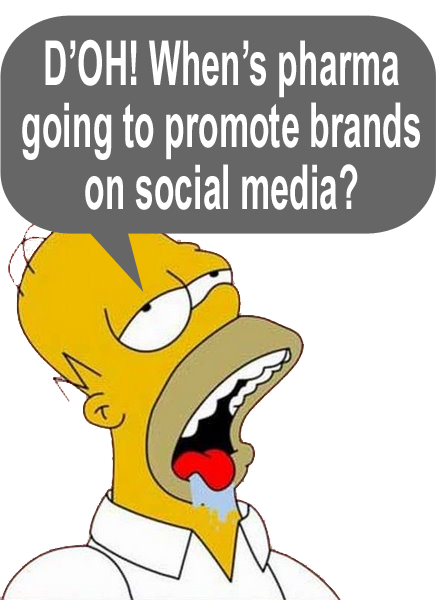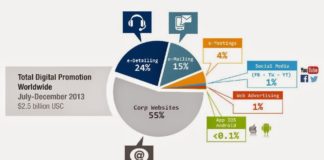There seems to be a sea change in the pharma social media landscape. Instead of optimism, I’m hearing many pessimistic comments from consultants and agencies that seem to have lost their patience with the pharmaceutical industry’s slow pace in leveraging social media to promote Rx brands.
First, BrainStorm Digital asked, “Is Pharma getting too excited about social media?” It was argued that pharma’s real focus should be in developing good drugs, because that is where the real competition is (see “Relax! It’s Okay For Pharma To Go Slow On Social Media“).
I even suggested that the FDA was getting impatient with pharma’s use of social media (see “FDA Launches Social Media Educational Initiative for Pharma“).
Today, I read Bill Evans/Dose of Digital’s post “Is It Time For Pharma To Give Up The Social Media Ghost?,” which lead to a brief conversation in which Bill said “pharma isn’t in the publishing business.”
That raised the hackles of my neck because it reminded me of a similar comment I heard from a pharma brand team member way back in the early nineties BEFORE Al Gore even invented the Internet! See the end of this post for more about that.
Here’s the gist of Evans’ argument and the conversations that ensued (somewhat edited)…
Evans makes the case that pharma should not use social channels for brand promotion because “a brand can only stick to discussing what is explicitly accounted for in it’s label” and consequently “the parameters for discussion become increasingly narrow.”
Ergo, when pharma does use social media (e.g., YouTube) for branded messaging (e.g., see “AZPurpleZone: A Nexium Branded YouTube Channel“), it turns off comments. “People shouldn’t be fooled into thinking this is a ‘social’ program,” says Evans. “Just watching a video isn’t a SOCIAL engagement. For brands, producing video content is great, an absolute must if you will. But putting that video, even in YouTube, with comments turned off isn’t social at all.”
“I feel you Bill,” said Craig DeLarge, Global Leader, Multichannel Marketing Strategy & Innovation at Merck, “and would like to suggest that you are referring more to social media promotion than social media at large. I still think that there are fruitful engagements for pharma in social listening, customer care, and reputation mgmt as you acknowledged. I think that customer care is the great unrealized opportunity we have overlooked in social media. You know how it is. We have to ride the hype curve to the plateau of productivity.”
“Everything you mention is spot on,” Evans responded, “but I still feel like brands (not the corporate brand) but product brands, are not suited for the space, and the resources and expenditures required to be suited for it would have almost no positive revenue impact for a product.”
In other words, Evans believes that unless a brand name is mentioned, there’s no positive ROI possible for social media channel use.
I suggested that “unbranded” promotion and conversation is something that pharma companies are doing via social media and that has value. “Pharma marketers do a heck of a lot UNBRANDED marketing, which is eminently suitable for social media as demonstrated by several pharma companies,” I said. “Some pharma marketers are so focused on figuring out how to promote brands via social media, however, that they are not seeing the plainly obvious unbranded opportunities out there (e.g., read “Some Pharma Marketers Can’t See the Unbranded SM Forest for the Branded SM Tree.”
That’s when Evans made his comment about publishing:
“If you run a product that has multiple competitors, unbranded promotions make absolutely ZERO business sense. It’s not about what a brand can do, but about what a brand should do to have the most benefit for both it’s product and its customers. Is following a brand on twitter really bringing any value if all it posts is unbranded content that I could otherwise get from 1,000 different sources really worthwhile? Add to that the fact that pharma isn’t in the publishing business, so that content won’t nearly be updated as often. When you really look at the business impact, especially for unbranded promotions, it just doesn’t make sense.”
I defended the value of unbranded messages and conversations in social media channels. “Unbranded promotions DO make business sense. After all, that’s what the rest of the pharma world does outside the U.S. Instead of giving up the social media ghost, pharma might consider giving up the branded DTC ghost!
“Even in a branded DTC world, unbranded advertising is a good business strategy for the category leader, but it can also help differentiate the others as well (e.g., read about how Sanofi is doing this: “Dennis Urbaniak, Joan Mikardos, and Laura Kolodjeski of Sanofi US Receive the 3rd PharmaGuy Social Media Pioneer Award“)
“Many of the competing branded ads I see are so similar to one another (e.g., see “DTC Melee–a-Trois: Pradaxa, Xarelto, and Eliquis“), they might as well be unbranded because they don’t know how to do branded advertising in any media — even the ones where FDA guidance is well established (i.e., print and TV).
Regarding “pharma isn’t in the publishing business,” I said (rephrased) “Pharma is in the COMMUNICATION business and it must PUBLISH content to be competitive in a world where every Tom, Dick and Harry is publishing content about its products via social media. Therefore, I re-iterate that pharma IS in the publishing business and it is losing ground — i.e., share of voice.”
That’s my opinion and I’m sticking to it? What do you think?
BTW, my nineties’ encounter with “pharma isn’t in the publishing business” comment had to do with suggesting that the pharma brand team consider building a drug information website because it was sitting on tons of content about its product and the disease state it treated and that the general public would benefit from this information.
Of course, that was in 1993 or 1994, before the 1996 public hearing at the FDA regarding regulation of the pharma industry on the Internet. At that time, pharma companies only had corporate websites. I see a similarity to today when most pharma companies only use social media for corporate promotion and not brand promotion. But just as the industry eventually launched branded Web 1.0 sites, it will eventually use social media to promote brands as well because pharma IS in the publishing business and social media is the future of publishing.









![6 Digital Tools at the Center of Healthcare Digitalization [INFOGRAPHIC]](http://ec2-54-175-84-28.compute-1.amazonaws.com/pharma-mkting.com/wp-content/uploads/2021/04/6DigitalTools_600px-100x70.jpg)




